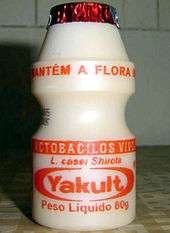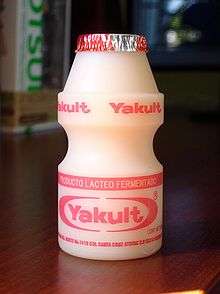Yakult
 | |
| Industry | Probiotic Drinks |
|---|---|
| Founded | 1935 |
| Headquarters | Minato-ku, Tokyo, Japan |
Key people | Sumiya Hori (Chairman), Khamis Agear |
| Website | www.yakult.co.jp/english/ |
Yakult (ヤクルト Yakuruto) is a probiotic dairy product made by fermenting a mixture of skimmed milk with a special strain of the bacterium Lactobacillus casei Shirota. It was created by Japanese scientist Minoru Shirota, who graduated from the Medical School of Kyoto University in 1930. In 1935, he started manufacturing and selling Yakult. Official claims state that the name is derived from jahurto, an Esperanto word for "yogurt".[1] Since then, Yakult has also introduced a line of beverages for the Japanese market that contain Bifidobacterium breve bacteria, and has also used its lactobacilli research to develop cosmetics. More recently, the Yakult Honsha played a major role in developing the chemotherapy drug irinotecan (Camptosar, CPT-11).[2]
After its introduction in Japan and Taiwan, Yakult was first sold in Brazil in 1966,[3] due to the large number of Japanese immigrants in the country, before it was marketed elsewhere. Today, Yakult is sold in 31 countries,[4] although its bacteria cultures are provided from a mother strain from Japan regardless of production location.
Yakult is marketed in different sizes. In Australia and New Zealand, Europe, India, Indonesia, and Vietnam Yakult comes in 65mL bottles. In America (including Mexico, one of Yakult's largest selling markets), Japan, Philippines, Thailand, Malaysia and South Korea, 80 ml bottles are available. It is also available in Singapore, Hong Kong, Taiwan and China where Yakult comes in 100 ml bottles.[5][6][7]
The product is made by Yakult Honsha Co., Ltd. (株式会社ヤクルト本社 Kabushiki-gaisha Yakuruto Honsha) (TYO: 2267), where Groupe Danone has a 20% share. The company also owns one of Japan's major baseball franchises, the Tokyo Yakult Swallows. It has been also one of the partner companies of the FINA World Aquatics Championships since 2005.
Nutritional value
Standard Yakult (excludes variations such as in Yakult Light) contains:[8]
- Sugar (sucrose, dextrose)
- Skimmed milk powder
- Natural flavours
- Live Lactobacillus casei Shirota strain, 6.5 billion per 65 ml bottle (concentration of 108 CFU/mL)
- Water
Standard Yakult contains 14g of sugar for every 100g, but comes in 65 ml bottles. This concentration is higher than the level defined as "HIGH" by the UK Food Standards Agency (described for concentrations of sugar above 15g per 100g).[9] As a comparison Coca-Cola and orange juice are around 10g of sugar per 100g, but with a serving size usually greater than 250 ml, while Yakult is served in much smaller doses. Based on the existence of many products like Yakult in the world market and the content of milk protein (1.4 g per 100 ml),[10] it was classified as a fermented milk named "Fermented Milk Drinks" of the Codex Standard. Through nutrient profiling guidelines, current health claim regulation in European Union may forbid the use of health claim on food products that are nutritionally unbalanced, but dairy products and probiotic drinks are likely to be considered as favourable carrier because their health benefits outweigh the fact they might be high in one of the designated 'unhealthy' ingredients.[11]
Scientific basis
According to the manufacturer's website, the benefits of Yakult consumption are supported by an array of scientific studies.[12] Those could range from maintenance of gut flora,[13] "modulation" of the immune system,[14] regulation of bowel habits and constipation[15] and finally effects on some gastrointestinal infections.[16] Although the number of scientific papers is large, most of them are based on in vitro and in vivo experiments, with some human clinical trials done on cohorts[17][18][19] and with daily consumption of 40–100 billions of probiotic L. casei Shirota,[14] far above the single bottle concentration of approximately 6.5 billion. In 2010, an EFSA panel concluded that a cause and effect relationship has not been established between the consumption of Lactobacillus casei strain Shirota and maintenance of the upper respiratory tract defence against pathogens by maintaining immune defences.[20] In September 2014, University College London published the results of testing using stomach fluids from pigs. The tests found that Yakult had sufficient bacteria, but "fell short" as the bacteria were unable to survive in the stomach. Yakult responded by claiming that independent studies had shown the bacteria do better in the human digestive system.[21]
Production
Yakult opened a factory in Fountain Valley, California in the United States in 2014.[22] Yakult is also manufactured in Australia in Dandenong, Victoria. A manufacturing plant of Yakult is situated at Haryana, India.[23]
In Malaysia, Yakult is manufactured at their factory located at Seremban, Negeri Sembilan.
Yakult opened a factory in Calamba, Laguna in the Philippines due to their popularity.
Varieties
 Yakult Light 65ml available in Australia.
Yakult Light 65ml available in Australia. Yakult 300 Light 100ml available in Taiwan.
Yakult 300 Light 100ml available in Taiwan.- 4 different flavours of 100ml bottles of Yakult available in Singapore. (Original, orange, grape, green apple)
- Yakult LT 100ml available in Hong Kong. (advertised as Low-Sugar Hi-Fibre)
- Yakult Light 100ml available in Hong Kong. (discontinued, replaced by Yakult LT)
Yakult around the world
 Glass Yakult bottles used before 1968 in Japan.
Glass Yakult bottles used before 1968 in Japan. Philippine Yakult
Philippine Yakult Brazilian Yakult.
Brazilian Yakult. Greater China (Canton district excluded) Yakult.
Greater China (Canton district excluded) Yakult. Yakult 80 ml available in Mexico.
Yakult 80 ml available in Mexico. Thai Yakult.
Thai Yakult.- Philippine Yakult.
- Yakult 65 ml in Vietnam.
 Yakult 65 ml in Italy.
Yakult 65 ml in Italy. Yakult and Korean competitor. (H Mart in New England.)
Yakult and Korean competitor. (H Mart in New England.)
See also
- Kefir
- Probiotic
- Tokyo Yakult Swallows
- Yakult lady
- Carlos Kasuga (founder of Yakult Mexico)
References
- ↑ "Dr. Shirota - Visionär und Gutmensch". Yakult Deutschland. Retrieved 2016-01-04.
- ↑ Yakult company profile: Pharmaceutical Division
- ↑ Yakult page in Portuguese
- ↑ "Yakult Europe – Yakult worldwide". Retrieved 2007-01-16.
- ↑ "Yakult USA". Retrieved 2007-01-16.
- ↑ "Yakult Australia – What is Yakult?". Retrieved 2007-01-16.
- ↑ "Yakult Taiwan". Retrieved 2007-01-16.
- ↑ "Yakult Australia – Nutritional Information". Retrieved 2007-01-16.
- ↑ "Food Standards Agency – Healthy Diet – Sugars". Eatwell.gov.uk. 2011-03-29. Retrieved 2011-11-17.
- ↑
- ↑ "Nutraingredients.com". Nutraingredients.com. Retrieved 2011-11-17.
- ↑ Yakult07.co.uk Archived April 9, 2008, at the Wayback Machine.
- ↑ Yakult07.co.uk Archived January 19, 2008, at the Wayback Machine.
- 1 2 Yakult07.co.uk Archived April 9, 2008, at the Wayback Machine.
- ↑ Yakult07.co.uk Archived April 9, 2008, at the Wayback Machine.
- ↑ Yakult07.co.uk Archived January 19, 2008, at the Wayback Machine.
- ↑ Takeda K, Okumura K (Mar 2007). "Effects of a fermented milk drink containing Lactobacillus casei strain Shirota on the human NK-cell activity". J Nutr. 137 (3 Suppl 2): 791S–3S. PMID 17311976.
- ↑ Morimoto K, Takeshita T, Nanno M, Tokudome S, Nakayama K (May 2005). "Modulation of natural killer cell activity by supplementation of fermented milk containing Lactobacillus casei in habitual smokers". Prev Med. 40 (5): 589–94. doi:10.1016/j.ypmed.2004.07.019. PMID 15749143.
- ↑ Spanhaak S, Havenaar R, Schaafsma G (Dec 1998). "The effect of consumption of milk fermented by Lactobacillus casei strain Shirota on the intestinal microflora and immune parameters in humans". Eur J Clin Nutr. 52 (12): 899–907. doi:10.1038/sj.ejcn.1600663. PMID 9881885.
- ↑ "EFSA – Scientific Opinion of the NDA Panel: Lactobacillus casei strain Shirota and maintenance of the upper respiratory tract defence against pathogens by maintaining immune defences". Efsa.europa.eu. doi:10.2903/j.efsa.2010.1860. Retrieved 2011-11-17.
- ↑ Yapp, Robin. (September 12, 2014). "Probiotic drinks 'don't do any good': Study finds 'good' bacteria in many products does not even reach the small intestine", The Daily Mail. Accessed December 29, 2014.
- ↑ Mueller, Mark (June 28, 2010). "Yakult To Build Fountain Valley Plant for U.S. Expansion". Orange County Business Journal. 33 (26): 1, 23.
- ↑ http://www.yakult.co.in/contactus.aspx